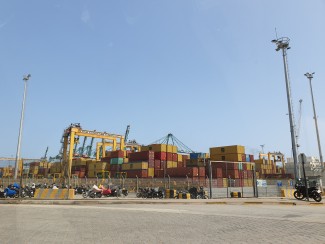In 2020, Togo, a West African country bordering Ghana, Benin and Burkina Faso, was the first exporter of organic soybean to the European Union, ahead of China and India.
This was unthinkable just five years ago.
In 2015, the country produced less than 25,000 tons of soybeans. Since then, production increased five-fold to more than 200,000 tons in 2021. More importantly, the beans reached key markets in the Netherlands, Vietnam, the United States, and India.
How did this happen?
Simply, through careful nurturing of the entire soybean value chain by the Government of Togo, with support from the Enhanced Integrated Framework (EIF).
Testing the beans
Soybean is not indigenous to Togo. It was introduced to the country in the 1980s by the German Development Cooperation (GIZ) to provide protein-based food supplement to reduce malnutrition.
Testing the different types of beans is important to selecting the varieties best matched to Togo’s soil and climate. In 2015, the Government of Togo partnered with an agricultural research center to test new varieties of seeds and select the most promising ones.
Between 2015 and 2018, 112 tons of these new seeds were distributed to more than 200 cooperatives, through a project managed by the Government of Togo and EIF. The initiative sprouted and production of soybeans grew by 73% in the country during this period.
Strengthening the value chain
Mobilizing producers, processors and traders into cooperatives was key to strengthening the value chain. It led to the creation of associations such as the Interprofessional Council for the Soybean Sector in Togo, the National Federation of Soybean Producers Cooperatives, the Togolese Association of Transformers of Soybeans, and the National Association of Soybean Traders-Exporters. Each provided services to its members, ranging from teaching good farming and harvesting practices, to securing organic certification for the beans.
The Interprofessional Council for the Soybean Sector in Togo, for example, supports more than 24,000 producers, including 9,000 women. According to Mr. Adji Tchepan, project leader at the Ministry of Trade and Commerce in Togo, "these associations constitute a forum that brings together producers so they can collaboratively find solutions to their problems, and progress in the same direction. It is an opportunity for them to be supported by a body that ensures their constant advancement and development as professionals”.
The importance of these associations to the strength of the value chain cannot be underestimated as it creates a solid community on which the members can rely.
Injecting funds into the sector
Access to credit has played an important role in the success of the soybean industry in Togo and the government has negotiated access to export credit. In total, 281 million West African CFA Francs were mobilized from three commercial banks in Togo and made available to more than 4,000 producers and exporters. This allowed exporters to grow their business by more than 80% between 2015 and 2018, increasing soybean export earnings by 353% over the same period.
However, "access to credit is a daily challenge, especially for producers," said Mr. Tchepan. "Even today commercial banks hesitate to lend to producers, so the latter often have to turn to micro-finance organizations to get the financial support they need to expand their field operations, acquire equipment or even pay field laborers".
But the situation is slowly changing for the better. With the boom in soybean production across the country, commercial banks are becoming more aware of the sector and its success. They are starting to see the potential in lending to soybean producers who supply the exporters.
Support from the top
The government of Togo is an active supporter of the soybean industry. It regularly meets with key industry bodies and validates ongoing reglementary tests. In addition, there is an interparliamentary coordination committee established by presidential decree to closely monitor the sector’s performance.
This government endorsement ensures the healthy and prosperous development of the soybean sector throughout the country. It is a prime example of how governments can support the development of private sectors. While the project to enhance the soybean sector ended in 2019, this close involvement of the government will ensure the sustainability of impressive progress in one of Togo's most important exports.
What's next for Togolese soybean?
As with any agricultural endeavors in the 21st century, Togo’s soybean producers have to contend with the threats of a changing climate. "The sector is especially vulnerable to climate change," noted Mr. Tchepan, "as Togo does not have irrigation systems. They mainly rely on Mother Nature to rain on the crops."
So far, the lack of irrigation has not deeply affected production. However, Mr. Tchepan said that it had rained less in the north of the country last year, which had slightly impacted production.
"This is an issue that increasingly comes up during inter-profession meetings and has been identified by agronomic studies," he said. "Everyone is talking about irrigation and the need to facilitate the access to water." There is a real concern around ensuring that climate change does not wipe out the impressive gains that Togo has made in the past five years in increasing the volume and quality of this production.
From €500 per ton in 2020, soybeans are now selling for more than €900 or even €950. Soybeans thus continue to offer a bright future for Togo's economy. The next move by the government and inter-professional associations lies in protecting these gains by building a climate-resilient soybean agricultural value chain.
In the English fairy tale Jack and the Beanstalk, magic beans lifted a young boy out of a life of poverty; in Togo, soybeans are bringing similar real-life miracles to the country’s farmers and exporters.
If you would like to reuse any material published here, please let us know by sending an email to EIF Communications: eifcommunications@wto.org.



